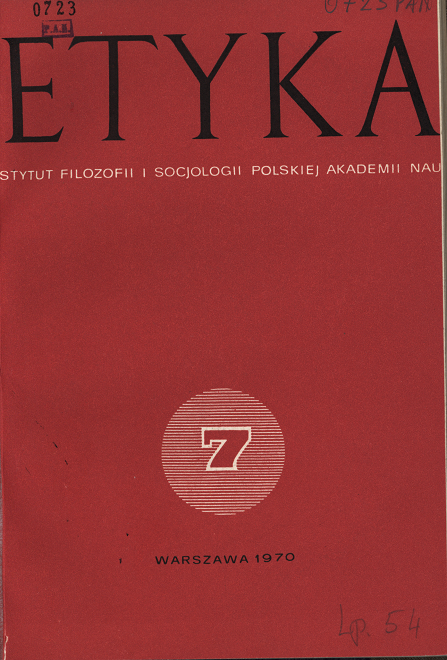Problemy i kierunki rozwoju współczesnej etyki radzieckiej
Abstrakt
The sixth decade of this century may be considered a period of dynamic development of the Soviet ethics. In contrast with the post-revolutionary period, the ethics does not limit itself to a normative reflection, but starts also extensive studies in the theory of ethics. According to the authors of the present article, there are all reasons to believe that the marxist ethics will become a scientific discipline in a full sense of the word. The purpose of the article is not to discuss all problems involved in the contemporary Soviet ethics, but above all to outline main problems and trends of its development. The authors distinguish following aspects of the ethical investigations: philosophical, sociological, social-psychological, axiological, pedagogical, historical, gnoseological, logical, and metaethical. Together with a critical evaluation of solutions of certain problems, they criticize some abstractive and ahistorical, in their opinion, approach to ethics which has been manifested above all in works of Y. A. Milner-Irinin and P. M. Egides.Pobrania
Opublikowane
Numer
Dział
Licencja
Prace publikowane w czasopiśmie ETYKA udostępniane są na podstawie licencji Creative Commons Attribution No Derivatives 4.0 International (CC BY-ND), tj. uznanie autorstwa-Bez utworów zależnych. Oznacza to, że Autorki i Autorzy zachowują autorskie prawa majątkowe do utworów i wyrażają zgodę, aby ich prace były zgodnie z prawem ponownie wykorzystywane do dowolnych celów, także komercyjnych, za wyjątkiem tworzenia utworów zależnych (dzieł pochodnych), bez konieczności uzyskania uprzedniej zgody ze Autora lub wydawcy. Artykuły mogą być pobierane, drukowane, powielane i rozpowszechniane z zastrzeżeniem konieczności poprawnego oznaczenia autorstwa oraz oryginalnego miejsca publikacji. Autorzy zachowują prawa autorskie do wspomnianych utworów bez innych ograniczeń.



